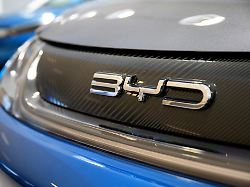Largest electric car manufacturer in the world
Price war is causing problems for BYD
March 26, 2024, 7:04 p.m
Listen to article
This audio version was artificially generated. More info | Send feedback
Last year, the Chinese company BYD replaced the US giant Tesla as the world’s best-selling electric car manufacturer – mainly thanks to high discounts on the domestic market. But the heavy price reductions are not without consequences.
The brutal price war on the Chinese market is eating into the sales and profit growth of the electric car manufacturer BYD. In the fourth quarter, sales only grew by 15 percent to 180.04 billion yuan (23 billion euros), and net profit grew by 19 percent to 8.67 billion yuan, as BYD explained in a mandatory announcement. That was the smallest quarterly profit increase in almost two years. For the full year 2023, profit of 30.04 billion yuan was 81 percent above the previous year’s level.
With high discounts in the Chinese market – last year, according to Reuters calculations, an average of 17 percent for the 13 best-selling models – BYD took the crown of the world’s best-selling electric car manufacturer from Tesla in the fall. This is eating into returns – but the Chinese are continuing their strategy this year with even more aggressive price discounts. The revised Seal electric sedan, which came onto the market on Monday, costs 5.3 percent less than the previous model. It is the 16th vehicle since the beginning of the year for which BYD has reduced the price after a facelift.
BYD is reacting to the fact that the market for electric cars in China is no longer growing as strongly. Last year, sales figures only increased by 21 percent – after 74 percent in 2022. Competitors such as Tesla, Geely, GAC Aion, Leapmotor and Xpeng are entering into the price war with BYD, but are not offering anywhere near as high discounts.
China-focused market researcher John Zeng of GlobalData in London said BYD could make up for the discounts with savings and with increasing exports, which are subject to higher prices. Last year, the 240,000 vehicles exported accounted for eight percent of production, and Zeng expects 300,000 to 400,000 export cars for 2024.
